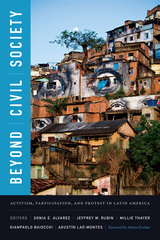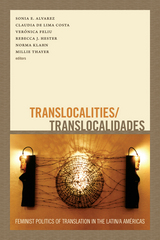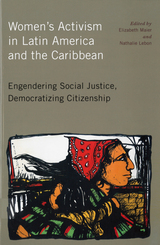3 books by Alvarez, Sonia

Beyond Civil Society
Activism, Participation, and Protest in Latin America
Sonia E. Alvarez, Jeffrey W. Rubin, Millie Thayer, Gianpaolo Baiocchi, and Agustín Laó-Montes, editors
Duke University Press, 2017
The contributors to Beyond Civil Society argue that the conventional distinction between civic and uncivic protest, and between activism in institutions and in the streets, does not accurately describe the complex interactions of forms and locations of activism characteristic of twenty-first-century Latin America. They show that most contemporary political activism in the region relies upon both confrontational collective action and civic participation at different moments. Operating within fluid, dynamic, and heterogeneous fields of contestation, activists have not been contained by governments or conventional political categories, but rather have overflowed their boundaries, opening new democratic spaces or extending existing ones in the process. These essays offer fresh insight into how the politics of activism, participation, and protest are manifest in Latin America today while providing a new conceptual language and an interpretive framework for examining issues that are critical for the future of the region and beyond.
Contributors. Sonia E. Alvarez, Kiran Asher, Leonardo Avritzer, Gianpaolo Baiocchi, Andrea Cornwall, Graciela DiMarco, Arturo Escobar, Raphael Hoetmer, Benjamin Junge, Luis E. Lander, Agustín Laó-Montes, Margarita López Maya, José Antonio Lucero, Graciela Monteagudo, Amalia Pallares, Jeffrey W. Rubin, Ana Claudia Teixeira, Millie Thayer
Contributors. Sonia E. Alvarez, Kiran Asher, Leonardo Avritzer, Gianpaolo Baiocchi, Andrea Cornwall, Graciela DiMarco, Arturo Escobar, Raphael Hoetmer, Benjamin Junge, Luis E. Lander, Agustín Laó-Montes, Margarita López Maya, José Antonio Lucero, Graciela Monteagudo, Amalia Pallares, Jeffrey W. Rubin, Ana Claudia Teixeira, Millie Thayer
[more]

Translocalities/Translocalidades
Feminist Politics of Translation in the Latin/a Américas
Sonia E. Alvarez, Claudia de Lima Costa, Verónica Feliu, Rebecca J. Hester, Norma Klahn, and Millie Thayer, eds.
Duke University Press, 2014
Translocalities/Translocalidades is a path-breaking collection of essays on Latin American, Caribbean, and United States–based Latina feminisms and their multiple translations and cross-pollinations. The contributors come from countries throughout the Américas and are based in diverse disciplines, including media studies, literature, Chicana/o studies, and political science. Together, they advocate a hemispheric politics based on the knowledge that today, many sorts of Latin/o-americanidades—Afro, queer, indigenous, feminist, and so on—are constructed through processes of translocation. Latinidad in the South, North and Caribbean "middle" of the Américas, is constituted out of the intersections of the intensified cross-border, transcultural, and translocal flows that characterize contemporary transmigration throughout the hemisphere, from La Paz to Buenos Aires to Chicago and back again. Rather than immigrating and assimilating, many people in the Latin/a Américas increasingly move back and forth between localities, between historically situated and culturally specific, though increasingly porous, places, across multiple borders, and not just between nations. The contributors deem these multidirectional crossings and movements, and the positionalities engendered, translocalities/translocalidades.
Contributors. Sonia E. Alvarez, Kiran Asher, Victoria (Vicky) M. Bañales, Marisa Belausteguigoitia Rius, Maylei Blackwell, Cruz C. Bueno, Pascha Bueno-Hansen, Mirangela Buggs, Teresa Carrillo, Claudia de Lima Costa, Isabel Espinal, Verónica Feliu, Macarena Gómez-Barris, Rebecca J. Hester, Norma Klahn, Agustín Lao-Montes, Suzana Maia, Márgara Millán, Adriana Piscitelli, Ana Rebeca Prada, Ester R. Shapiro, Simone Pereira Schmidt, Millie Thayer
Contributors. Sonia E. Alvarez, Kiran Asher, Victoria (Vicky) M. Bañales, Marisa Belausteguigoitia Rius, Maylei Blackwell, Cruz C. Bueno, Pascha Bueno-Hansen, Mirangela Buggs, Teresa Carrillo, Claudia de Lima Costa, Isabel Espinal, Verónica Feliu, Macarena Gómez-Barris, Rebecca J. Hester, Norma Klahn, Agustín Lao-Montes, Suzana Maia, Márgara Millán, Adriana Piscitelli, Ana Rebeca Prada, Ester R. Shapiro, Simone Pereira Schmidt, Millie Thayer
[more]

Women's Activism in Latin America and the Caribbean
Engendering Social Justice, Democratizing Citizenship
Edited and with an introduction by Elizabeth Maier and Nathalie Lebon
Rutgers University Press, 2010
Women's Activism in Latin America and the Caribbean brings together a group of interdisciplinary scholars who analyze and document the diversity, vibrancy, and effectiveness of women's experiences and organizing in Latin America and the Caribbean during the past four decades. Most of the expressions of collective agency are analyzed in this book within the context of the neoliberal model of globalization that has seriously affected most Latin American and Caribbean women's lives in multiple ways. Contributors explore the emergence of the area's feminist movement, dictatorships of the 1970s, the Central American uprisings, the urban, grassroots organizing for better living conditions, and finally, the turn toward public policy and formal political involvement and the alternative globalization movement. Geared toward bridging cultural realities, this volume represents women's transformations, challenges, and hopes, while considering the analytical tools needed to dissect the realities, understand the alternatives, and promote gender democracy.
[more]
READERS
Browse our collection.
PUBLISHERS
See BiblioVault's publisher services.
STUDENT SERVICES
Files for college accessibility offices.
UChicago Accessibility Resources
home | accessibility | search | about | contact us
BiblioVault ® 2001 - 2024
The University of Chicago Press









